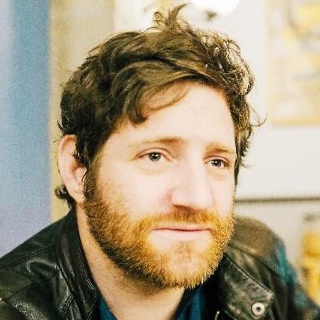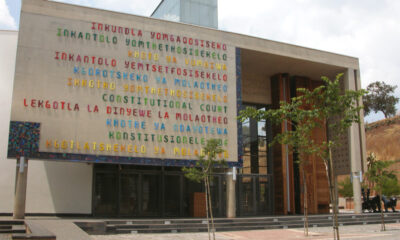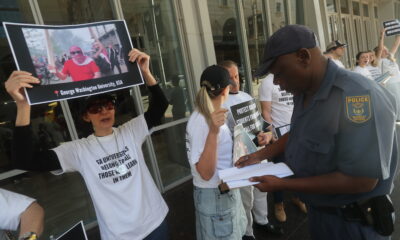
OpEds

BDS – more chaos than coalition
In the incessant din of antisemitism that has invaded our public square since 7 October, it can be confusing to understand where it’s coming from and why.
However, if you disentangle from the noise, it’s easier to deal with. Anti-Israel groups in the Boycott, Divestment, Sanctions (BDS) coalition converge in their opposition to Israel, but diverge in their motivation, tactics, and ultimate goals.
Broadly speaking, four philosophical currents animate the BDS movement in South Africa: Islamists; extreme African nationalists; Stalinist leftists; and what’s known as the “new left” – “identitiarians”, or “wokists”. Each of these groups brings its own strengths, weaknesses, and internal contradictions, making the BDS campaign a potent force and a fractured coalition.
While these distinctions aren’t absolute, this framework can help us to understand the movement.
Islamists shouldn’t be confused with Muslims. While Islam is a faith practised by millions, Islamism is a political ideology that seeks to establish states governed by Islamic law, often through coercive means.
Some Islamists even advocate for the use of violence, commonly referred to as jihadism. In the context of the BDS campaign, Islamists view Israel as an impediment to their broader goal of establishing theocratic governance in the Middle East. For them, the existence of a Jewish state in what they consider Muslim lands is intolerable.
In South Africa, Islamists have been particularly vocal, organising protests in cities like Cape Town. They are well-funded through countries like Iran, ideologically driven, and highly organised. However, their violence and confrontational approach often alienates potential supporters.
African nationalists, including some parts of the African National Congress/Economic Freedom Fighters have historically aligned themselves with the Palestinian cause. However, their support for the BDS campaign isn’t purely ideological, it’s also driven by economic considerations.
African nationalists often have a xenophobic strain to their thought, and view Jews in South Africa as competitors for economic dominance. This economic paradigm, coupled with historical ties to the Palestinians, fuels their involvement.
Africanists aren’t primarily focused on the Israeli-Palestinian conflict, but if they do become involved, their outsized influence on state power makes them dangerous.
The historically Stalinist left in South Africa, exemplified by the South African Communist Party, approaches the Israeli-Palestinian conflict through the lens of anti-imperialism. It views Israel as a tool of global imperialism, primarily serving the interests of the United States. For Stalinists, Israel is part of a broader network of capitalist exploitation. They believe that antisemitism isn’t a real phenomenon, and will eventually disappear when a global workers’ revolution materialises.
The Stalinist left has numbers on its side, particularly through its influence within trade unions and other mass movements. However, its rigid ideology and dogmatic approach often limits its ability to adapt to changing circumstances.
The identitarian faction within the BDS movement can normally be identified through its love of prefixes – feminists/queers/environmentalists/Swifties/Jews for a free Palestine. Comprising feminists, LGBTQ+ (lesbian, gay, bisexual, transgender, and queer or questioning) activists, and other progressive groups, such groups view the Israeli-Palestinian conflict through the lens of oppression and privilege. They see Israel as a “white” colonial power oppressing “brown” Palestinians, and their discourse often revolves around issues of race, gender, and social justice.
Identitarians are often skilled at shaping public opinion through social media and OpEd columns. However, their influence is largely confined to elite circles and online platforms. In spite of their eloquence, they lack the numbers and grassroots support of the other factions within the BDS movement. Their insistence on ideological purity can also alienate potential allies, particularly those who don’t share their specific social-justice framework.
What unites these groups is their shared opposition to Israel’s right to exist and their lack of faith in the values of liberal democracy. However, this unity is tenuous at best. Each faction is “totalising” in its worldview, meaning that it seeks to impose its vision of society on everyone else. This creates significant internal contradictions as the different factions often have mutually incompatible goals. For example, Islamists are vehemently opposed to the LGBTQ+ rights championed by identitarians, while Stalinists find religious fanaticism an affront to their secular ideology. African nationalists, for their part, are wary of both Stalinists and Islamists, fearing that their wealth and power could be threatened by either group.
These internal tensions make the BDS movement in South Africa chaotic, disorganised, and rife with backstabbing and intrigue. Occasionally, however, these disparate elements can come together to pursue their shared goals, such as during moments of heightened conflict in Gaza or political instability.
The recent South African elections provided a rare moment of such unity. Various factions rallied around the cause while the fighting heated up in Gaza and the International Criminal Court focused its attention on Israel. However, the elections didn’t go as planned. The splintering of the ANC/leftist formations, the identitarian parties’ failure to gain significant traction, and the loss of key Islamist enablers like Dr Naledi Pandor in Parliament were all important blows.
As the conflict in Gaza has started to turn against Hamas, and as pro-Israel parties have gained power in South Africa’s new government, the BDS coalition has once again fragmented. Each faction has retreated to its own corner, pursuing a hodge podge of unrelated agenda items, some writing scathing OpEds, others trying to ban Israel from international events, and a few attempting to block South African exports to Israel, the full movement not working together in spite of the noise.
Overall, the past few months have taught us that in spite of the noise and tough politics, South Africans are a tolerant people and there’s no broad support for the extremism of any of the factions of BDS. We even have our own network of pro-Israel allies. Together, we can turn the tide for a more pro-Israel, positive South African future.
- Benji Shulman is an executive office bearer of the South African Zionist Federation.











Jessiica
August 30, 2024 at 10:48 am
Nope, there’s absolutely no distinction between Islam and Islamism, for the simple reason that Islam is a theocracy, that is, both a religion and a political power. That’s why Shariah is the fundamental law wherever Islam comes into power. Islamism is merely its political expression. Claims that there’s a difference is mere woke/Islamist propaganda.
Also, the “new left” or “wokists” is by far the dominant hive of antisemitism in the West and has fully “absorbed” BDS and Stalinists in its process of development. Wokery, after all, is just another nickname for international socialism aka Globalism.
And Wokery’s antisemitism is only one reason for its match of convenience with Islam. There’s f.i. also woke discrimination against women (absurdly in favour of “transgender women”, who are despised by Islam) and a profound hatred of free speech, movement and association, etc.
Gary Selikow
August 30, 2024 at 8:30 pm
the left say they all about human rights and compassion etc Unless of course you belong to a politically incorrect group like Israelis, pro-Israel Jews, White working class people, Kurds , Tibetans, Uyghurs, Bahais in Iran, Hindus, Christians in Muslim countries, dissidents in Iran, Zimbabwe , China, Cuba, Venezuela, North Korea etc,